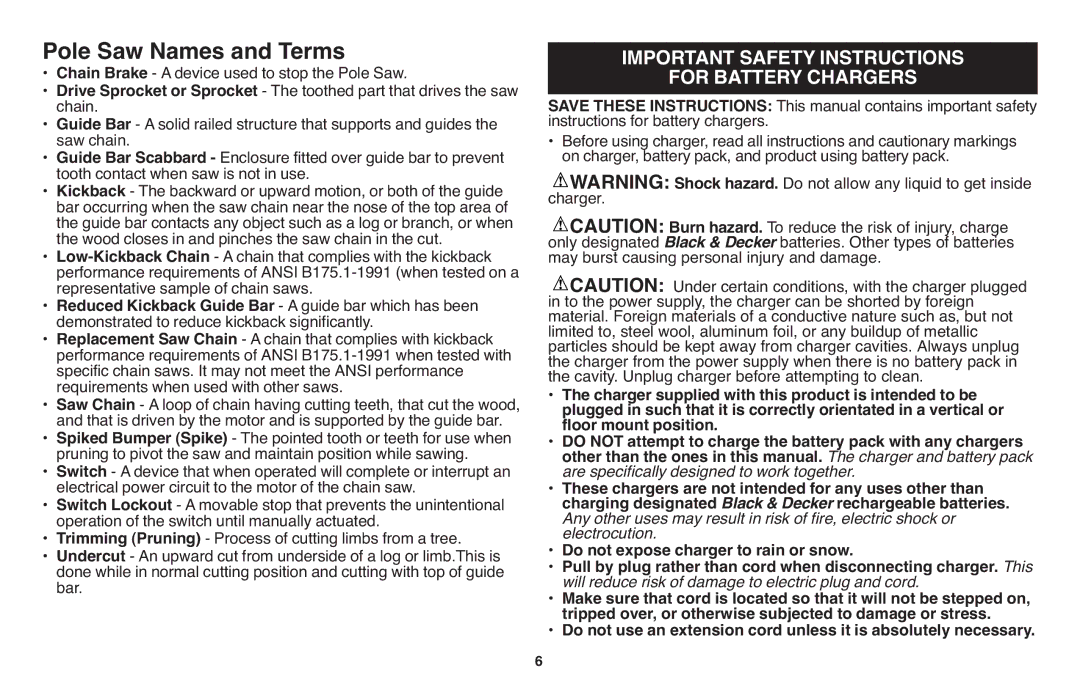
Pole Saw Names and Terms
• Chain Brake - A device used to stop the Pole Saw.
• Drive Sprocket or Sprocket - The toothed part that drives the saw chain.
• Guide Bar - A solid railed structure that supports and guides the saw chain.
• Guide Bar Scabbard - Enclosure fitted over guide bar to prevent tooth contact when saw is not in use.
• Kickback - The backward or upward motion, or both of the guide bar occurring when the saw chain near the nose of the top area of the guide bar contacts any object such as a log or branch, or when the wood closes in and pinches the saw chain in the cut.
•
• Reduced Kickback Guide Bar - A guide bar which has been demonstrated to reduce kickback significantly.
• Replacement Saw Chain - A chain that complies with kickback performance requirements of ANSI
• Saw Chain - A loop of chain having cutting teeth, that cut the wood, and that is driven by the motor and is supported by the guide bar.
• Spiked Bumper (Spike) - The pointed tooth or teeth for use when pruning to pivot the saw and maintain position while sawing.
• Switch - A device that when operated will complete or interrupt an electrical power circuit to the motor of the chain saw.
• Switch Lockout - A movable stop that prevents the unintentional operation of the switch until manually actuated.
• Trimming (Pruning) - Process of cutting limbs from a tree.
• Undercut - An upward cut from underside of a log or limb.This is done while in normal cutting position and cutting with top of guide bar.
IMPORTANT SAFETY INSTRUCTIONS
FOR BATTERY CHARGERS
SAVE THESE INSTRUCTIONS: This manual contains important safety instructions for battery chargers.
• Before using charger,read all instructionsand cautionarymarkings on charger,battery pack, and product using battery pack. ![]() WARNING: Shock hazard. Do not allow any liquid to get inside
WARNING: Shock hazard. Do not allow any liquid to get inside
charger.
CAUTION: Burn hazard. To reduce the risk of injury, charge only designated Black & Decker batteries. Other types of batteries may burst causing personal injury and damage.
CAUTION: Under certain conditions, with the charger plugged in to the power supply, the charger can be shorted by foreign material. Foreign materials of a conductive nature such as, but not limited to, steel wool, aluminum foil, or any buildup of metallic particles should be kept away from charger cavities. Always unplug the charger from the power supply when there is no battery pack in the cavity. Unplug charger before attempting to clean.
• The charger supplied with this product is intended to be plugged in such that it is correctly orientated in a vertical or floor mount position.
• DO NOT attempt to charge the battery pack with any chargers other than the ones in this manual. The charger and battery pack are specifically designed to work together.
• These chargers are not intended for any uses other than charging designated Black & Decker rechargeable batteries. Any other uses may result in risk of fire, electric shock or electrocution.
• Do not expose charger to rain or snow.
• Pull by plug rather than cord when disconnecting charger. This will reduce risk of damage to electric plug and cord.
• Make sure that cord is located so that it will not be stepped on, tripped over, or otherwise subjected to damage or stress.
6 • Do not use an extension cord unless it is absolutely necessary.
